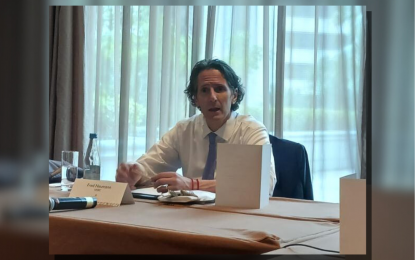
RESILIENT. HSBC managing director and chief Asia economist Frederic Neumann says on Wednesday (Sept. 27, 2023) the Philippine economy is on soft landing but it is expected due to the tightening of the Bangko Sentral ng Pilipinas’ key policy rates. He said the inflation rate remains sticky, thus the projection of a 25-basis point increase in the central bank’s key rates before this year ends and another 50 basis points increase in the second half of 2024. (PNA photo by Joann S. Villanueva)
MANILA – An economist of HSBC on Wednesday said the slight Philippine economic slowdown is expected as the cost of tightening monetary policy to address the elevated inflation rate.
In a briefing on Wednesday, Frederic Neumann, HSBC managing director and chief Asia economist, said the bank forecasts the domestic economy to expand by 4.8 percent this year, 5.2 percent in 2024 and 5.8 percent in 2025.
These figures are lower than the government’s 6 to 7 percent growth assumption for 2023, and the 6.5 to 8 percent assumption for 2024 to 2028.
The country’s gross domestic product (GDP) slowed for the third consecutive quarter to 4.3 percent from April to June 2023.
Neumann attributed the decline partly to the rising Bangko Sentral ng Pilipinas (BSP) key policy rates, which monetary authorities said were made to help address the elevated inflation rate.
The rate of price increase has been on the uptrend since 2022 because of the upticks in the prices of oil and other commodities in the international market as a result of the Russia-Ukraine conflict and the rising Federal Reserve key rates, among others.
BSP’s key rates, in turn, have been hiked by a total of 425 basis points since May 2022, both to address the rise of inflation and the Federal Reserve’s key rates, among others.
Neumann expects inflation to remain sticky “over the next two years” and “might trend up again once it goes down because price pressures continue to bubble up.”
He said this situation is not unique to the Philippines but is a worldwide condition.
“Vigilance is required when it comes to inflation,” he said, citing authorities’ efforts to address the situation and the risks that inflation “will go beyond target again.”
Last August, inflation ended its six-month slide after accelerating to 5.3 percent from the previous month’s 4.7 percent.
The inflation rate has peaked since last year. Last January, it rose to 8.7 percent, the highest in 14 months.
The average inflation in the first eight months this year stood at 6.6 percent, way above the government’s 2 to 4 percent target band.
Neumann said risks to inflation lean on the upside given its structural features such as climate change which impacts on food and food prices.
With inflation expected to remain elevated in the medium term, Neumann forecasts the BSP’s policy-making Monetary Board (MB) to raise the central bank’s key rates by another 25 basis points before the end of this year and 50 basis points in the second half of 2024, before a total of 100 basis points reduction in 2025.
The HSBC executive said he does not consider the BSP’s tightening moves as slowing the economy’s growth too much, adding it is the cost of the central bank’s mandate to help address the rising inflation.
“I would say there’s a soft landing that is happening in the Philippines. We probably need a soft landing. And by the way, we need soft landing not just because of inflation but also because of the trade imbalance,” he said.
The country’s trade balance, or the difference between the value of its imports and exports, has been in deficit given the strong domestic demand.
With the rising oil and commodity prices in the global economy especially in 2022, the country’s trade balance widened and has impacted the country’s current account, which gauges the inflow and outflow of goods, services, and investment incomes and payments.
Neumann said the country “cannot run very large current account deficits for too long” so “in order to adjust the external imbalances, that requires actually weakening or softening of domestic demand.”
“And that’s what you achieve with high interest rates,” he said.
He forecasts the country’s current account to remain in deficit “in the next couple of years.”
Amidst all these factors, the HSBC economist said the Philippines continues to have an edge because of a demographic dividend that is benefiting the business process outsourcing and tourism sectors, among others.
The BPO sector is now among the domestic economy’s growth drivers, with the Information Technology and Business Process Association of the Philippines (IBPAP) projecting revenues to reach USD35.9 billion this year, up from last year’s USD32.5 billion revenues.
Last year, the BPO sector employed around 1.57 million full-time employees. This year, the number of full-time employees is projected to reach 1.7 million.
The tourism sector is also among the major growth drivers of the economy.
In 2022, the sector contributed 6.2 percent to the domestic growth. This year, it is projected to expand further given the reopening of the country following the lockdowns during the pandemic. (PNA)
